BusinessEurope Headlines No. 2022-34
Macroeconomic Dialogue: businesses face a difficult winter
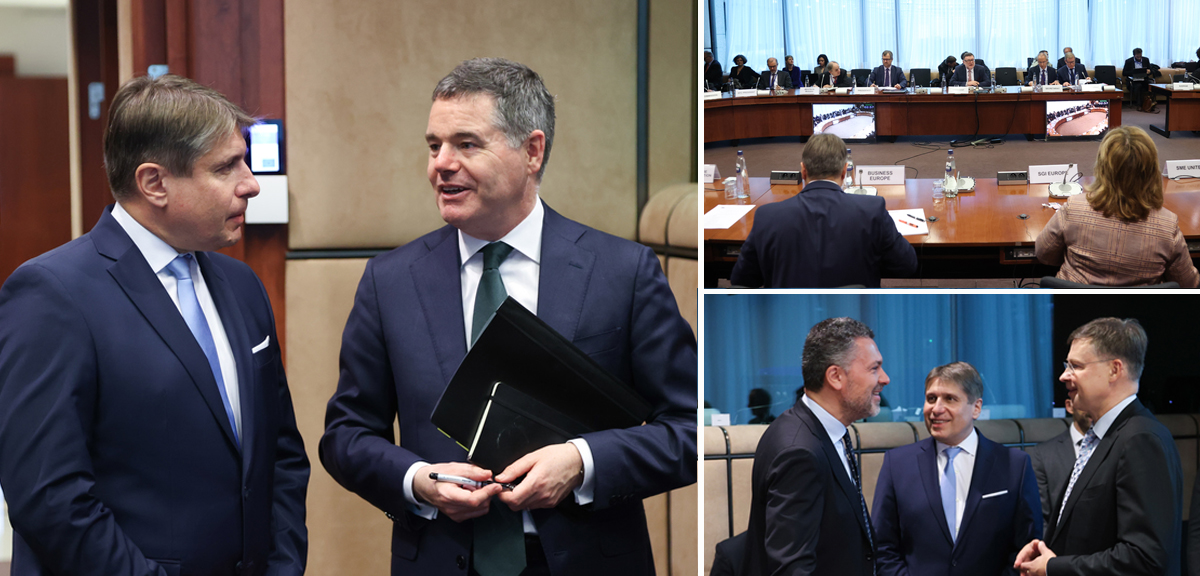
Business sentiment has declined rapidly after a strong first half year driven by post-Covid service sector reopening. Soaring energy bills and continuing supply chain disruptions mean costs for businesses are rising much faster than consumer inflation. EU leaders need to agree urgently on new measures to alleviate energy costs for businesses. These were the main messages from BusinessEurope Director General Markus J. Beyrer at the Macroeconomic Dialogue, which drew together social partners and European institutions representatives on 7 November. Policy-makers, Beyrer noted, should consider EU-wide measures to temporarily decouple electricity prices from gas prices and grant governments the necessary flexibility to support businesses while maintaining a level playing field on the single market. The outlook for the European economy and impact of energy prices on European business are discussed in detail in our Autumn Economic Outlook, released this week.
![]() Contact: James Watson
Contact: James Watson
Video message
COP27: European business expectations
Our Adviser for Climate Policy Steffen Engling is at the COP 27. Watch him talk about our side events and the position of the European business community.
New publication: Autumn Economic Outlook
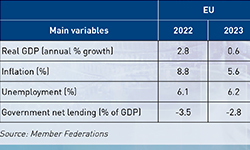 Our Autumn Economic Outlook, published this week, shows that growth in the EU is set to fall to 0.6% in 2023, a downward revision of 1.5 percentage points since our summer forecast. With energy bills and supply-chain disruptions strongly impacting businesses, macro and micro policies that address these main issues are essential.
Our Autumn Economic Outlook, published this week, shows that growth in the EU is set to fall to 0.6% in 2023, a downward revision of 1.5 percentage points since our summer forecast. With energy bills and supply-chain disruptions strongly impacting businesses, macro and micro policies that address these main issues are essential.
Strengthening a demand-led migration approach through skills matching
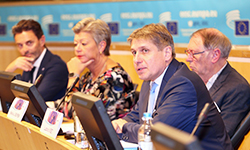 European labour markets are facing a number of challenges, including labour and skills shortages, demographic ageing, high rates of inactivity, and relatively low levels of intra-EU mobility. Part of the response should be to strengthen the role that economic migration plays in helping to address employers’ labour and skills needs. BusinessEurope calls on the European Commission to make progress towards an EU expression of interest type of economic migration system to help Europe become more attractive to available talents globally. We look forward to contributing to shape with the Commission the full version of the proposed talent pool to make sure it is well aligned with employers’ needs across Europe. This was a key message given by BusinessEurope Director General Markus J. Beyrer during a joint seminar organised by BusinessEurope and the Employers’ Group at the European Economic and Social Committee on 7 November. The event had the participation of the European Commissioner for Home Affairs, Ylva Johansson. An EU talent tool has potential to facilitate a targeted matching between skilled third-country nationals and job vacancies in the EU. Using well-designed and regularly updated national shortage occupation lists as a starting point for this matching process would be a good way to help address identified labour and skills shortages through matching third-country nationals according to their skills and qualifications. The EU domestic workforce realities should also be taken into account through revisited and user-friendly labour market tests at the national level. Attracting third-country nationals of all skills levels will be particularly important as a factor of European competitiveness, especially as a growing proportion of the current working age population retires in the years ahead.
European labour markets are facing a number of challenges, including labour and skills shortages, demographic ageing, high rates of inactivity, and relatively low levels of intra-EU mobility. Part of the response should be to strengthen the role that economic migration plays in helping to address employers’ labour and skills needs. BusinessEurope calls on the European Commission to make progress towards an EU expression of interest type of economic migration system to help Europe become more attractive to available talents globally. We look forward to contributing to shape with the Commission the full version of the proposed talent pool to make sure it is well aligned with employers’ needs across Europe. This was a key message given by BusinessEurope Director General Markus J. Beyrer during a joint seminar organised by BusinessEurope and the Employers’ Group at the European Economic and Social Committee on 7 November. The event had the participation of the European Commissioner for Home Affairs, Ylva Johansson. An EU talent tool has potential to facilitate a targeted matching between skilled third-country nationals and job vacancies in the EU. Using well-designed and regularly updated national shortage occupation lists as a starting point for this matching process would be a good way to help address identified labour and skills shortages through matching third-country nationals according to their skills and qualifications. The EU domestic workforce realities should also be taken into account through revisited and user-friendly labour market tests at the national level. Attracting third-country nationals of all skills levels will be particularly important as a factor of European competitiveness, especially as a growing proportion of the current working age population retires in the years ahead.
Contact: Robert Plummer
EU social dialogue initiative: more space for social partners negotiations in Member States
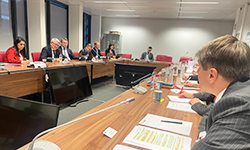 The upcoming EU social dialogue initiative needs to encourage Member States, providing more space for social dialogue and collective bargaining at the national level. Enabling autonomous collective bargaining is of essence as employers and workers are best placed to agree on how to secure the necessary labour market protections and flexibility. This includes the key role of jointly agreed derogations to EU and national labour laws to adapt working conditions to changing economic conditions. It is important that this initiative respects the diversity of national industrial relations practices and the autonomy of social partners, while recognising that the role of social partners can legitimately be different in different Member States. Lastly, the upcoming EU social dialogue initiative should include concrete tripartite arrangements towards a strengthened cooperation between the European Commission, Member States and social partners to improve the performance of labour markets and social systems. This is particularly essential at times like at present when there are key issues to resolve such as labour and skills shortages and the sustainable financing of social protection. These were amongst the key messages given by BusinessEurope Director General Markus J. Beyrer during a meeting between the European Commissioner for Jobs and Social Rights, Nicolas Schmit, and the EU cross-industry social partners on the upcoming social dialogue initiative on 8 November. The initiative comprises a Council communication and recommendation and is set to be published in the first part of next year under the Swedish presidency of the Council of the EU.
The upcoming EU social dialogue initiative needs to encourage Member States, providing more space for social dialogue and collective bargaining at the national level. Enabling autonomous collective bargaining is of essence as employers and workers are best placed to agree on how to secure the necessary labour market protections and flexibility. This includes the key role of jointly agreed derogations to EU and national labour laws to adapt working conditions to changing economic conditions. It is important that this initiative respects the diversity of national industrial relations practices and the autonomy of social partners, while recognising that the role of social partners can legitimately be different in different Member States. Lastly, the upcoming EU social dialogue initiative should include concrete tripartite arrangements towards a strengthened cooperation between the European Commission, Member States and social partners to improve the performance of labour markets and social systems. This is particularly essential at times like at present when there are key issues to resolve such as labour and skills shortages and the sustainable financing of social protection. These were amongst the key messages given by BusinessEurope Director General Markus J. Beyrer during a meeting between the European Commissioner for Jobs and Social Rights, Nicolas Schmit, and the EU cross-industry social partners on the upcoming social dialogue initiative on 8 November. The initiative comprises a Council communication and recommendation and is set to be published in the first part of next year under the Swedish presidency of the Council of the EU.
Contact: Cerutti Maxime
Industry meets Heads of Trilateral Patent Offices
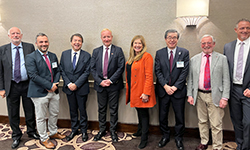 European, American and Japanese Heads of Intellectual Property (trilateral) Offices met with their industry patent users' counterparts (BusinessEurope from the European side) in North Carolina, USA, on 8 November to discuss how the patent system could be further digitalised and how to support small and medium-sized enterprises to be made aware of the opportunities intellectual property can bring for growth. Trilateral Offices process the greater part of all patent applications filed worldwide. Industry representatives expressed their support for the Trilateral Offices’ work to improve the digitalisation of patenting processes. There was also a call to advertise the many benefits societies and economies draw from innovation, of which IP is an enabler. On 7 November, BusinessEurope also attended a meeting with industry partners to exchange views on common business priorities in patent law.
European, American and Japanese Heads of Intellectual Property (trilateral) Offices met with their industry patent users' counterparts (BusinessEurope from the European side) in North Carolina, USA, on 8 November to discuss how the patent system could be further digitalised and how to support small and medium-sized enterprises to be made aware of the opportunities intellectual property can bring for growth. Trilateral Offices process the greater part of all patent applications filed worldwide. Industry representatives expressed their support for the Trilateral Offices’ work to improve the digitalisation of patenting processes. There was also a call to advertise the many benefits societies and economies draw from innovation, of which IP is an enabler. On 7 November, BusinessEurope also attended a meeting with industry partners to exchange views on common business priorities in patent law.
Contact: Oliveira Pedro
How to foster trade between the EU and Thailand
 “There is a strong interest in creating the conditions for deeper trade and investment between the European Union and Thailand when the political situation allows it”, said Eleonora Catella, Deputy Director at the International Relations Department of BusinessEurope, at a focus group meeting organised by the Department of Trade Negotiations within Thailand’s Ministry of Commerce on 8 November. The event gathered leading European business and industry representatives. It aimed to establish an open dialogue and discussion on the potential of an EU-Thailand free-trade agreement and to exchange views and insights on how to foster growing trade and investment ties between the two economic actors. “Thailand is a growing economy with a great untapped potential in a number of sectors, from renewable energy to infrastructure, in the increasingly strategic region of South-East Asia”, Catella added.
“There is a strong interest in creating the conditions for deeper trade and investment between the European Union and Thailand when the political situation allows it”, said Eleonora Catella, Deputy Director at the International Relations Department of BusinessEurope, at a focus group meeting organised by the Department of Trade Negotiations within Thailand’s Ministry of Commerce on 8 November. The event gathered leading European business and industry representatives. It aimed to establish an open dialogue and discussion on the potential of an EU-Thailand free-trade agreement and to exchange views and insights on how to foster growing trade and investment ties between the two economic actors. “Thailand is a growing economy with a great untapped potential in a number of sectors, from renewable energy to infrastructure, in the increasingly strategic region of South-East Asia”, Catella added.
Contact: Catella Eleonora
Transparency as a fundamental right in the AI Act
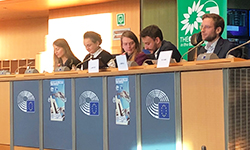 Speaking at the event “Fundamental Rights in the AI Act”, hosted by the Greens in the European Parliament on 9 November, BusinessEurope Adviser Jan Rempala stated that transparency is essential, but it is important that the AI Act’s provisions focus on providing meaningful and essential information rather than detailed technical readouts. “To do this, businesses need streamlined and consistent obligations and we need to factor costs”, he said. Rempala spoke on a panel regarding transparency, alongside the Dutch State Secretary for Digitisation Alexandra van Huffelen; and MEP Kim van Sparrentak, who is Greens/EFA shadow rapporteur on the AI Act, among others. He elaborated further on the AI Act’s proposal to oblige registration of high-risk systems in a database, by pointing out that obligations to register are not in line with the New Legislative Framework and that such a database risks being bloated and could paradoxically undermine social trust in AI by presenting all systems as equally risky. Thus, having a proper classification method for identifying high-risk systems is paramount, he concluded.
Speaking at the event “Fundamental Rights in the AI Act”, hosted by the Greens in the European Parliament on 9 November, BusinessEurope Adviser Jan Rempala stated that transparency is essential, but it is important that the AI Act’s provisions focus on providing meaningful and essential information rather than detailed technical readouts. “To do this, businesses need streamlined and consistent obligations and we need to factor costs”, he said. Rempala spoke on a panel regarding transparency, alongside the Dutch State Secretary for Digitisation Alexandra van Huffelen; and MEP Kim van Sparrentak, who is Greens/EFA shadow rapporteur on the AI Act, among others. He elaborated further on the AI Act’s proposal to oblige registration of high-risk systems in a database, by pointing out that obligations to register are not in line with the New Legislative Framework and that such a database risks being bloated and could paradoxically undermine social trust in AI by presenting all systems as equally risky. Thus, having a proper classification method for identifying high-risk systems is paramount, he concluded.
Contact: Jan Rempala
Calendar 
- 11 November: BusinessEurope's COP27 joint side-event - Art. 6 of the Paris Agreement: understanding the current state of play and voluntary carbon markets
- 15 November: BusinessEurope's COP27 online joint side-event - CBAMs, Climate Clubs and Converging on Mitigation Ambition: Setting the right incentives for governments and business
- 15-16 November: G20 Bali Summit
- 16-17 November: European Business Summit
- 17 November: The Unitary Patent system – a game-changer for innovation in Europe
Not yet a subscriber? Register here.
Reminder: please have a look at our privacy policy